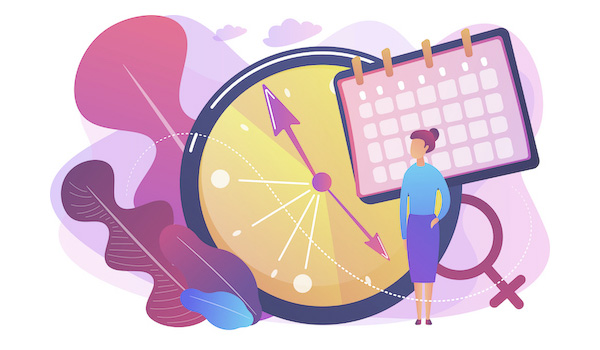More than 100,000 women over the age of 40 give birth each in the United States each year, including many women who have already gone through menopause. Curious about your chances for becoming pregnant as you enter perimenopause or complete the menopause transition? Telling the difference between menopause symptoms and signs of pregnancy may be confusing. Here’s what you need to know about menopausal hormonal changes and pregnancy.

Table Of Contents:
- What are my chances of getting pregnant after menopause?
- You can still get pregnant during perimenopause
- Am I menopause or pregnant? Common menopause and pregnancy symptoms
What are the chances of getting pregnant after menopause?
Menopause is reached when a woman’s menstrual cycles have stopped for 12 months. This milestone also represents the end of monthly ovulation and a woman’s ability to naturally become pregnant.
Can a woman still have a child once she’s gone through menopause? It’s possible. While ovulatory cycles cease once you’re in menopause, there’s still a chance for pregnancy via IVF (in vitro fertilization) and implantation of a fertilized donor egg.
In many ways, women have two biological clocks. One clock counts down your ability to ovulate and use your own eggs for pregnancy. This clock on natural fertility runs out in menopause. The other biological clock relates to your body’s ability to allow for successful implantation and gestation of a donor egg (or your own eggs that were previously frozen).
According to the American Society of Reproductive Medicine, any woman of any age can get pregnant — with assisted reproductive technology — provided that she has a “normal uterus” even if she no longer has ovaries or ovarian function.
So, with IVF after menopause, what are your chances of becoming pregnant after menopause? According to a study of post-menopausal pregnancy in the Journal of the American Medical Association, in a small group women, aged 50 to 63, who became pregnant via IVF and donor eggs, researchers found that after 121 attempts at IVF, there were 45 births. Given today’s advances in reproductive technology, if you are willing and able to undergo hormone treatments to prepare your body for pregnancy, pregnancy may be possible later and later in life.

You can still get pregnant during perimenopause
Perimenopause typically begins eight to 10 years before menopause, when the ovaries gradually begin to produce less estrogen and progesterone. Perimenopause usually begins in a woman’s 40s, but can start in her 30s as well.
Can women get pregnant during perimenopause? Yes, though it may take a little more trying compared to getting pregnant in your 20s. For healthy couples in their 20s and early 30s, around 1 in 4 women will get pregnant in any single menstrual cycle. By age 40, around 1 in 10 women will get pregnant per menstrual cycle.
The reason for this gradual lowering of fertility can be related to women’s hormones. During perimenopause, reproductive cycles often become irregular due an underlying hormonal imbalance, making it more difficult to pinpoint ovulation.
The number and quality of a women’s eggs may also be a factor. In general, a women begins puberty with between 300,000 – 500,000 eggs. This number drops to around 25,000 at age 37 and continues dropping to 1,000 or fewer by age 51. In addition to fewer viable eggs, women in perimenopause may be more likely to experience an “anovulatory” cycle in which they do not ovulate at all. Male fertility also declines with age which may add to fertility issues in older couples.
Still, with all this said, pregnancy is very much a possibility throughout perimenopause and more and more womenn are becoming pregnant during this stage of life. In their late 30s and 40s, women may find themselves at a good place in their career, or have the financial security they feel is needed before having a baby. Some women are finally with partners they want to have children with, or have decided to have a child on their own.
Important note: If you do not wish to become pregnant, birth control needs to remain a crucial part of your sex life in perimenopause. Some women may choose to continue taking birth control pills or explore their birth control options and switch to a non-hormonal form of birth control.
What are the risks?
According to the CDC, the number of first-time births among women ages 40 to 44 more than doubled between 1990 and 2012, and is still rising. The vast majority of women in this age group go on to experience completely normal and healthy pregnancies and births. However, older moms-to-be are also at higher risk for certain complications in pregnancy. These include:
- high blood pressure and the related pregnancy complication preeclampsia
- gestational diabetes
- birth defects, such as Down syndrome
- miscarriage
- low birth weight
If you do plan to get pregnant when you are in your 40s, it’s a good idea to have a fertility check up with your healthcare provider and start taking a prenatal multivitamin before trying to conceive.
Am I in menopause or pregnant? Common menopause and pregnancy symptoms
A confusing part about reproductive health when you are older is telling the difference between symptoms of menopause and signs of pregnancy. There is often overlap between the two, but if you learn the differences you will have an easier time understanding what’s going on inside your body.
Common menopause and pregnancy symptoms
Changes in your menstrual cycles
Skipping a menstrual period is often the first telltale sign that a woman may be pregnant. Missing a period could also be a sign that a women has entered the menopause transition. If you’ve been having intercourse, you may be inclined to take a pregnancy test. If not, look for other hormone-related signs that confirm menopause, such as hot flashes and low libido
Mood changes
Surging and fluctuating hormones in pregnancy and menopause can both lead to mood swings and irritability. In pregnancy, mood changes may cause you to be unusually emotional and weepy. In perimenopause, irritability, anxiety and depression are more the norm for mood changes. Are you crying one minute and laughing the next? It’s time to check in more with your body and whether your mood is related to perimenopause or pregnancy.
Fatigue and sleep changes
Hormonal changes in pregnancy and menopause can also result in fatigue and changes to sleep patterns, including insomnia. Whenever you notice changes in your sleep habits, it’s a good time to check in on the state of your hormones.
Weight gain
Hormonal changes in perimenopause make it easier to gain weight, especially midsection belly fat. Women also gain weight in pregnancy, of course! If you find yourself adding more pounds, you need to pay attention to when and how it all began. Is your weight gain that gradual creeping kind accompanied by other changes, like hot flashes and night sweats? Or are your jeans feeling a little more snug, and you’ve also stopped having your period and are experiencing nausea?
Breast tenderness
Many women say they first knew they were pregnant when their breasts suddenly became tender, sore and swollen. Women can also experience breast pain as part of a hormonal imbalance in menopause. Good breast self care is important. If you notice changes in your breasts, let your healthcare provider in on your symptoms.
Trying to conceive in your 40s? Check in on your hormonal health. What’s happening to your hormones and your body? Take our free menopause quiz to find out what your symptoms are telling you about where you are in the menopause transition.
References
- https://womenshealth.obgyn.msu.edu/blog/pregnancy-possible-during-perimenopause
- https://pubmed.ncbi.nlm.nih.gov/19933469/
- https://www.ncbi.nlm.nih.gov/pmc/articles/PMC7299412/









